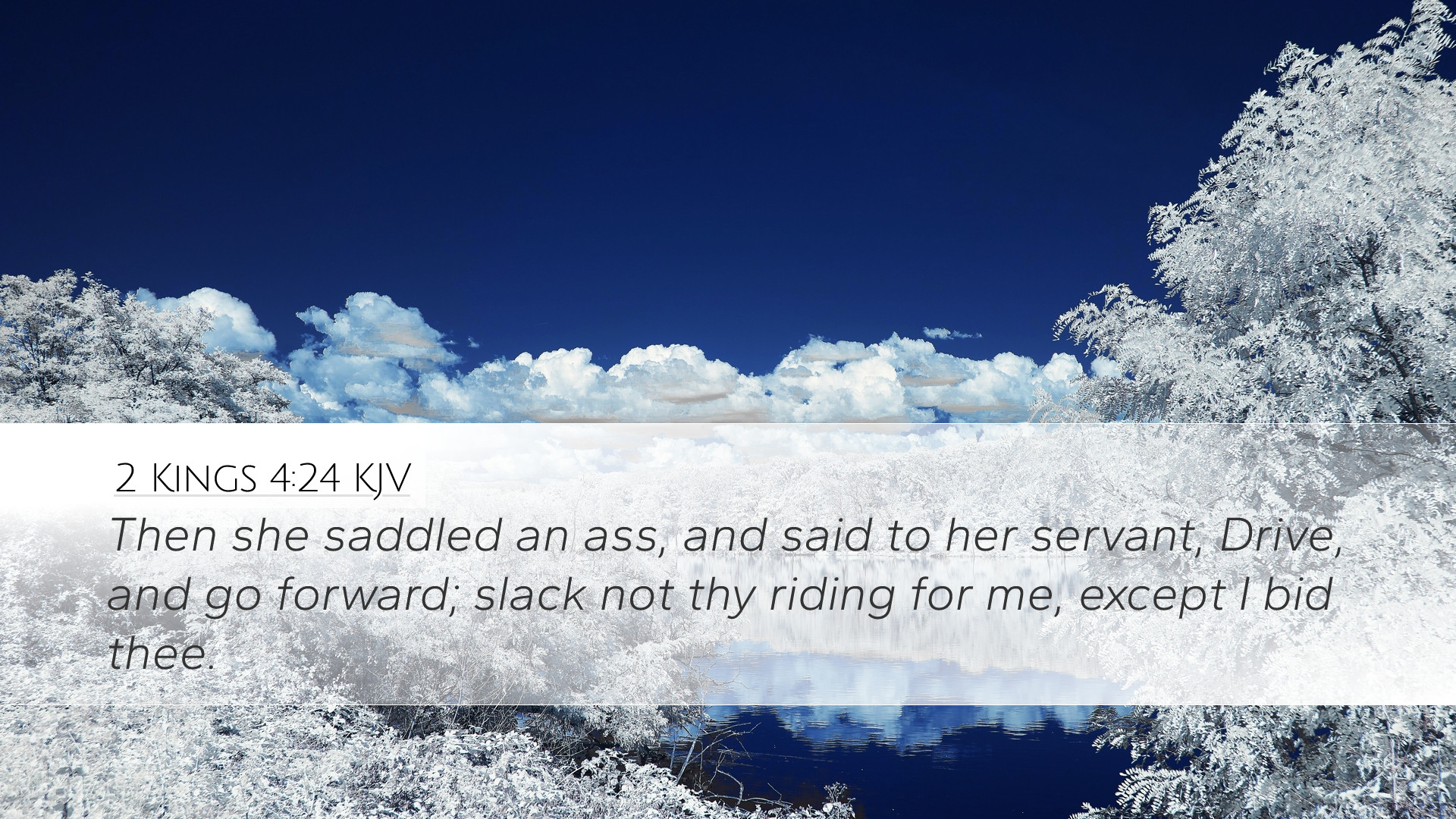Commentary on 2 Kings 4:24
2 Kings 4:24 states: "Then she saddled an ass, and said to her servant, Drive, and go forward; slack not thy riding for me, except I bid thee." This verse captures the urgency and determination of the Shunammite woman as she embarks on a journey to seek Elisha, the prophet. This commentary synthesizes insights from prominent public domain commentaries to explore the multifaceted implications of this passage.
Contextual Overview
The broader context of this verse lies within the narrative of the Shunammite woman, who, after receiving a miraculous blessing through Elisha—the birth of a son—faces the grave loss of her child. Her actions in 2 Kings 4:24 not only reveal her character but also highlight her profound faith in God's servant. In this moment of deep crisis, her unwavering resolve to seek help underscores key themes in biblical narrative: faith, perseverance, and divine intervention.
Insights from Commentators
Matthew Henry
Matthew Henry emphasizes the Shunammite woman's remarkable faith and her impulse to seek help through the prophet Elisha. He notes that her decision to saddle the donkey demonstrates her faith in the power of God working through Elisha. Henry observes:
- “Her immediate reaction to tragedy is a testimony of her faith; she does not despair but seeks the prophet who represents God’s authority and power.”
- “The act of saddling the donkey signifies readiness for action—a priority to resolve her crisis.”
Albert Barnes
Albert Barnes delves into the details of the Shunammite's actions and their significance. He explicates her command to her servant and interprets it as a metaphorical representation of the urgency of her situation:
- “‘Drive, and go forward’ reflects her determination; she is not to be delayed, and her faith propels her forward in the face of insurmountable odds.”
- “The phrase ‘slack not thy riding for me’ illustrates her desperate need for swift action, symbolizing her reliance on the prophet and belief in his intercession.”
Adam Clarke
Adam Clarke provides a rich theological context to the passage, highlighting the significance of the Shunammite woman's initiative. He focuses on several layers of meaning:
- “Her resolve to act immediately underscores the nature of faith; it is not passive but dynamic, seeking avenues to respond to crises.”
- “The details of her journey, including her insistence on speed, reveal a woman of action who believes that God can intervene in her situation.”
Theological Reflections
This passage is not merely a historical account but bears significant theological implications:
- Faith in Crisis: The Shunammite woman epitomizes the faithful response in the midst of grief. Her faith is both practical and spiritual, driving her to seek divine assistance.
- The Role of Intercession: The passage highlights the importance of intercessor figures in the biblical text. Elisha symbolizes a connection to God’s power, indicating the importance of seeking out those who can intercede on our behalf.
- Divine Providence: Her journey reflects the belief in God’s providence and care even in dire situations. The urgency with which she approaches her situation can be seen as an embodiment of the believer’s confidence in God’s ability to act.
Practical Applications
For pastors, students, theologians, and scholars, this verse serves as a rich source for reflection and application:
- Encouraging Active Faith: This passage emphasizes the need for believers to act in faith, even when circumstances appear hopeless.
- Understanding Grief and Loss: The Shunammite woman's response offers insight into how to navigate personal crises and grief while maintaining faith.
- Promoting Intercessory Prayer: The act of seeking Elisha can be a reminder of the importance of prayer and support from the faith community during challenging times.
Conclusion
The verse 2 Kings 4:24 encapsulates a moment of profound faith and determination illustrated by the Shunammite woman. Her actions challenge readers to reflect on their responses to adversity and to consider the roles of faith and community in seeking God's intervention. Drawing from the insights of Matthew Henry, Albert Barnes, and Adam Clarke enriches our understanding of this passage, showcasing its relevance for both personal spiritual growth and communal faith practice. The urgency with which she approaches her situation serves as a powerful testament to the interplay of faith and action in the believer’s life.


